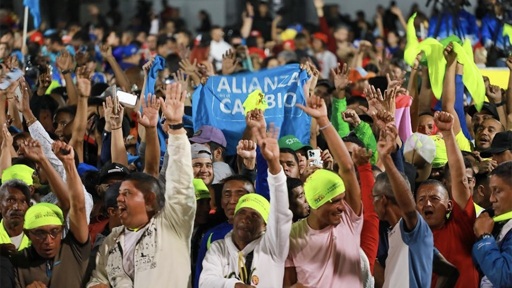In the elections held on July 27, the Gran Polo Patriótico (GPP), a coalition of political parties led by the ruling United Socialist Party of Venezuela (PSUV), was the overall winner.
According to Elvis Amoroso, President of the CNE, Chavismo would have won 23 out of 29 municipalities; he stated that the GPP would have triumphed in 280 out of 335 positions that were in dispute. According to estimates, 44% of Venezuelans voted.
Chavismo gains ground
One of the surprises of the day was the Chavista victory of Gian Carlos Di Martino in Maracaibo, which until Sunday had been one of the opposition’s strongholds.
In addition, Chavismo reaffirmed its control over the capital, Caracas, with the victory of Carmen Meléndez.
Another important victory for Chavismo took place in Sucre where they were able to recover the mayor’s office after several years.
Venezuelan President Nicolás Maduro celebrated the results: “Today the historic victory of the revolutionary popular bloc has been consolidated.”
In addition, Maduro pointed out that it is the beginning of a new opposition: “Just as today the historic victory of the revolutionary, Bolivarian and Chavista popular bloc has been consolidated, I also believe that today has been the day of birth of a new Venezuelan opposition that has the obligation to govern well from the 50 mayor’s offices they have won.”
Maduro refers to the sector of the opposition that did decide to participate in the elections, contrary to the wish of that opposition (led by María Corina Machado and former presidential candidate, Edmundo González) that called its followers not to run for office or go to the polls.
The opposition maintains some traditional bastions
The opposition, on the other hand, managed to maintain control over the municipalities of Baruta and Chacao, territories historically close to the opposition to the project inaugurated by Hugo Chávez.
Darwin González, Mayor of Baruta, said: “Thank you Baruta!!! We defended the house. We are going to work for all our neighbors.”
Gustavo Duque of Baruta thanked the supporters who backed his candidacy: On the other hand, Malena Fernández, of the Ecological Party, won the mayor’s office of El Hatillo.
Key opposition leader and former presidential candidate, Henrique Capriles, affirmed that it is necessary to participate in the elections: “For me, abstention cannot be the way. It is useless, we have already lived it. Abstention is nothingness and I prefer to express myself.” Capriles himself has strongly questioned the Venezuelan electoral system.
He also questioned the position of opposition leaders to call for abstention: “It is the last straw that there are some political leaders who live outside Venezuela who tell the neighbors of each one of the municipalities not to go out and vote… Politics in Venezuela, in general, has never been so fragmented, eroded, destroyed and that is why, once again, the total and absolute apathy”
This is the end of a series of elections in Venezuela that have managed to consolidate the position of Chavismo in the Venezuelan political landscape, but not without controversies and accusations of all kinds. According to the electoral calendar of the Caribbean country, new elections will not be held for another four years.
The post Chavismo sweeps Venezuela’s municipal elections appeared first on Peoples Dispatch.
From Peoples Dispatch via this RSS feed


